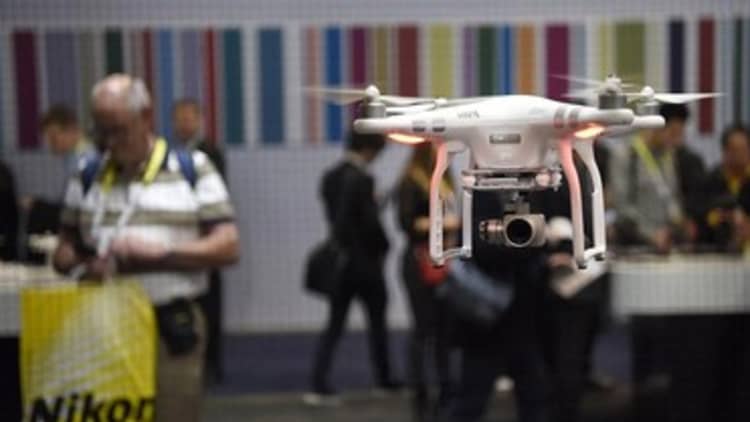There are 28 million small businesses in the country, and they provide most of America's jobs and sales. According to the Small Business Administration, large companies have cut four million jobs since 1990, while small businesses have created eight million. Most small businesses want to become big businesses, so a new dog-walking service is probably not going to turn into the next Uber (though you never know! Dream big!).
Here are some of the top, best, most promising industries you might want to consider where businesses are growing. They are also ripe for disruption.
Drones
Drones rule, even as the FAA still nails down drone rules. The commercial drone market is predicted to grow from around $550 million in 2014 to over $1 billion by 2022, according to Grand View Research. Average annual growth is predicted to be around 17 percent, with most of the growth coming from government work, followed by agriculture, energy, as well as entertainment and "other." "Other" could be retailers such as Amazon.
Drones remain imperfect, so disrupting the industry with better machines, operating systems, hybrid power supplies and pilots could provide opportunities. And speaking of Uber (I was, earlier), a drone company leases out drones and pilots on demand, and it's just been named one of Fast Company's most innovative companies.
Food
There are two areas of innovation you might consider in the area of food. One is fun, the other is important, and both can be profitable.
First, the fun part. If you can come up with something as popular as bacon, the world is your oyster. Americans are constantly in the hunt for the next food trend — broccoli greens are the new kale (yuck), fake meat is the new meat, artisanal bread is the new ... bread. Be the first to convince people that some crazy "fusion" mashup is delicious. Something insane, like ... like ... root beer potato chips dipped in mayo. I honestly just made that up, and I honestly just Googled it and found this.
Second, the important area of innovation. New processes to improve food safety through handling or manufacturing have become increasingly necessary after the Chipotle E. coli and norovirus scares. Americans want to eat local and eat organic, and when a restaurant is receiving food from a variety of suppliers, ensuring safety becomes more challenging. Or consider Food Analytics, which Inc. magazine calls an emerging industry, where companies develop "smart kitchen products or devices that help with food inventory management. Because that food truck in Austin needs help figuring out when to replace the BBQ sauce.
Babies
The U.S. birth rate is finally on the rise again, and millennials want to make sure their children are superior. Chemical-free diapers, gluten-free baby food, gender-free toys ... all that free isn't free. Just ask Jessica Alba, whose Honest Co. is trying to recover from a Wall Street Journal report claiming her wildly successful company hasn't exactly been honest about every ingredient. The company disputes those charges. In the meantime, database portal Statista predicts the global baby products market could grow to $67 billion next year.
Parenting magazine estimates parents spend almost $50 a week just on diapers, baby food and formula (if you don't breastfeed), or about $2,500 a year. Figure out a better way to build a diaper — or replace the diaper — and parents will beat a path to your business door. Replace the diaper? Do you think Thomas Edison set out to build a better candle? No, he wanted to replace it.
Health
Namaste. Just relax for a moment. Close your eyes and envision an island paradise. Better yet, get up and walk around the office for five minutes, then take another five finding a quiet place to regroup. You're welcome. That'll be $100.
Corporate health and wellness is a growing industry, as companies look for ways to keep employees healthier and happier. These upfront costs can save big later on the cost of medical problems and other issues. In-house yoga, team-building exercises, flexible scheduling, start a business which helps other businesses achieve goals of lowering costs and reducing burnout and turnover. IBIS World research estimates the corporate wellness industry is currently worth $8 billion, growing around 5 percent each year but poised for "robust growth."
Environment
The "green" house is hot. Environmentally friendly building practices and supplies are becoming a natural part of the American construction industry. The U.S. Green Building Council estimates about 1 in 4 new homes is being built with at least some green building practices. The numbers are similar in the hotel space. The organization — whose mission is to promote environmentally sound building — says "green construction is outpacing that of traditional construction and is poised to create more than 3.3 million U.S. jobs and $190.3 billion in labor earnings by 2018."
It turns out everything can be made "greener." Even brickmaking. A start-up called bioMASON has just raised $1.5 million in new funding as it attempts to perfect and scale a technology which creates bricks using bacteria. CEO Ginger Dosier said bioMASON can "grow" a brick as quickly as using a traditional kiln, keeping millions of tons of carbon out of the air. And it doesn't end there. Dosier told Wired, "We can make bricks that glow in the dark, bricks that absorb pollution, bricks that can change color when wet."
Turning your "green" brick house from red to green? Or have it glow in the dark on Halloween? That is what I call disruptive.




